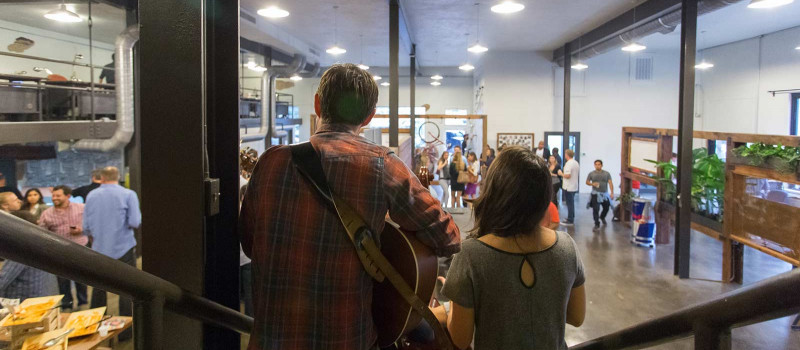More than likely, you’ve heard the term “crowdfunding” at some point in your life. Crowdfunding, for those who haven’t heard of it or have and feel like it’s too late to ask, is defined as “the practice of funding a project or venture by raising small amounts of money from a large number of people, typically via the Internet.” Basically, it’s like fundraising on steroids for your wildest dreams to come true. So, now that we’ve got that out of the way, what does crowdfunding look like in 2016?
The rise of Shark Tank has made small business lovers and venture capitalist aspirers out of us all (thanks Mark Cuban). For those of us that don’t own a professional basketball team, though, our opportunity to get in on the ground floor and reap the benefits of a successful startup is rather limited. Sure, you can get a really rad coffee mug in exchange for your contribution to a project on Kickstarter, but you can’t build your portfolio or put any real skin in the game. Until now. To make a long story short, legislation has just passed to allow you (yes, you) the ability to invest in a startup via a crowdfunding platform in exchange for an equity stake. To tell the whole story, however, we’ll have to venture back to 2012 and a little something called the JOBS Act. Time travel with me, won’t you?
In 2012, President Obama signed the JOBS (Jumpstart Our Business Startup) Act into effect. You can read more about that here and here, but essentially it makes it easier for startups to raise capital for seed rounds. Kickstarter and Indiegogo were already well underway at this point, but what it did was make way for equity crowdfunding. As I said before, traditional crowdfunding platforms were only able to offer rewards and perks in exchange for financial backing. Equity crowdfunding now made it possible to exchange equity for investment without having to issue an IPO, go the venture capitalist or angel investor route, or even the potentially crippling personal debt route. The caveat here is that only accredited investors were eligible to take advantage of equity crowdfunding. Accredited investors are required to have had an annual income of at least $200,000 for the last two years and/or a personal wealth of at least $1 million. Seeing as this is a pretty narrow group of people, the investor pool for equity crowdfunding is rather limited.
This is where Title III comes into play. The JOBS Act consists of four main titles: Emerging Growth Capital (Title I), Access to Capital for Job Creators (Title II), Crowdfunding (Title III), and Regulation A: A Small Entity Compliance Guide (Title IV). Title III expands the parameters of equity crowdfunding to allow non-accredited investors a seat at the table. So what does this mean for startups and potential investors? As cut and dry as it all sounds, there are about 600 pages of fine print in Title III outlining the requirements and limitations placed on both parties. These regulations limit the amount that can be invested and raised, require the disclosure of GAAP financials, and mandate approved platforms to provide resources and guidance to ensure minimal risk to the investor.
You can read more about the specifics here, but what it boils down to is the presumption that very few startups will resort to complying with these extensive and costly regulations when more established, quicker, and less expensive methods are available. There are two sides to every story, though, and what may seem like an unnecessary measure to one startup might be the saving grace of another.
A startup that lacks expansive networks or the ability to get in front of the right venture capitalist could benefit both professionally and financially from this opportunity. It drastically expands the pool of networks and potential investors. It also opens a wonderful door for the everyman to support someone’s dream while building a strong portfolio.
Like with anything else, some of the kinks and concerns of this initial enactment of Title III could be ironed out as the SEC sees fit. As of right now, Kickstarter and CircleUP have decided to keep their platforms closed to non-accredited investors, but still encourage and admire the transparency and openness it facilitates. In fact, Kickstarter doesn’t do equity crowdfunding at all citing that its platform of creative projects doesn’t mesh well with the investment model. Other platforms like WeFunder and Indiegogo are either already diving in or preparing to in the near future.
The primary thing that accredited and nonaccredited investors alike should celebrate is the continuously increasing support and facilitation of small business in the United States. The potential is great and the future is incredibly promising. So whether you’re creating your own project, funding a recording artist’s first demo in exchange for an exclusive concert, or investing in an innovative startup in exchange for equity – your time is now. So dreamers, doers, innovators, disruptors, and small business cheerleaders… Let’s get started!
Additional resources
http://www.huffingtonpost.com/josh-cline/the-six-things-nonaccredi_b_10104512.html

















